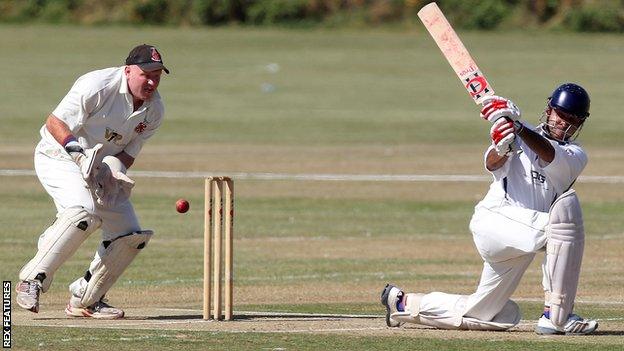Azeem Rafiq: Zoheb Sharif empowered by ex-Yorkshire player speaking out
- Published

Sharif (right) made four County Championship appearances for Essex
Warning: This piece contains offensive language.
Former Essex player Zoheb Sharif says Azeem Rafiq speaking up empowered him to talk about the racist abuse he faced himself and says he was "denied" an opportunity of having a career by the club.
On Tuesday, Rafiq told a DCMS select committee that English cricket is "institutionally" racist and racist language was "constantly" used during his time at Yorkshire.
Sharif, 38, said the abuse he faced "points to institutional racism" in English cricket.
Sharif and former bowler Maurice Chambers have both alleged racism at Essex in recent days.
"It was really hard to raise this before but Azeem has really opened a few doors for people to speak up and share their experiences," Sharif told BBC Sport.
"Azeem has given us that opportunity to talk and for future generations to have equality of opportunity to play and get selected on merit."
Sharif started playing for Essex at the age of eight and made four County Championship appearances for the club before being released.
He made his debut on 12 September 2001 against Yorkshire, the day after the 9/11 terrorist attacks in America, and has spoken of the discrimination he faced.
Sharif recounted how fellow players gave him the nickname 'Bomber', while also calling him 'curry muncher', as well as a derogatory term about Pakistani heritage.
Essex chief executive John Stephenson has said the club "will rigorously investigate all allegations" and referred the matter to the England and Wales Cricket Board (ECB).
In a statement on Monday after Chambers' allegations, Stephenson said he wants to "eliminate any behaviour which tarnishes the game I love" and "no-one at the club will stand for any form of discrimination".
Emotional Rafiq tells MPs about racism at Yorkshire
Sharif said: "As soon as I arrived in the changing room I was given the nickname 'Bomber'. This nickname stuck and was referred to by the players. This then moved on to 'curry muncher' and 'muncher' and for the other players it seemed normal, to call a player of Pakistani/Indian origin these names. That stayed throughout my time at the club.
"There were instances where I was not allowed to pray, even in a corner on the outfield. A senior player in the team took me to the side and told me not to do that in front of everyone else. From then on I didn't want to cause a nuisance so I prayed in my car.
"Whenever an Asian family came into the ground, players would ask, 'is that your family? There are so many of them' and laugh and make fun of situations."
Before he was released by the club, he was the highest run scorer in the whole country at second XI level, had also taken 20 wickets and was voted second XI player of the year.
But he says he was told by a committee member that no matter what he did on the pitch, he was "never going to play" for the first team.
Sharif is being supported by Nujum Sports, who look after the mental health and well-being of Muslim athletes.
He added: "It was hurtful because I could understand if I was released for not performing, I could take that, but my performances warranted attention. After getting released, you feel you have let everybody down, including family who are living their dreams through you.
"I felt as though I was denied an opportunity of having a career. My experiences through racism and discrimination, I felt my performances deserved an opportunity to be involved in the first team.
"There are elements of institutional racism within cricket. I do think elements of it are rooted in the game and in some counties. If you are constantly getting called 'bomber', 'curry muncher', not being allowed to pray, those examples point to institutional racism.
"As soon as it happened (being released), I felt Essex had really denied me an opportunity in playing cricket."

The King of Sumo: How this Hawaii-born wrestler took the sport by storm
Do managers have any sympathy for referees?: Paul Lambert reveals all to Sacked in the Morning
